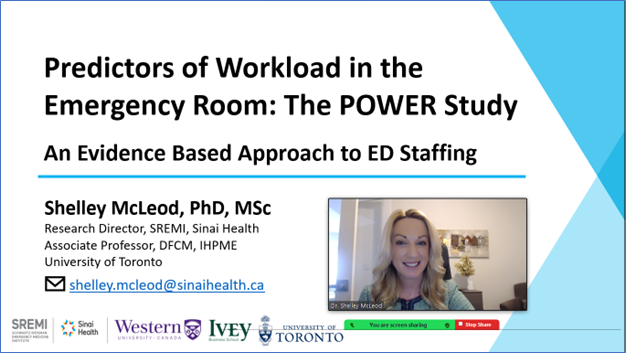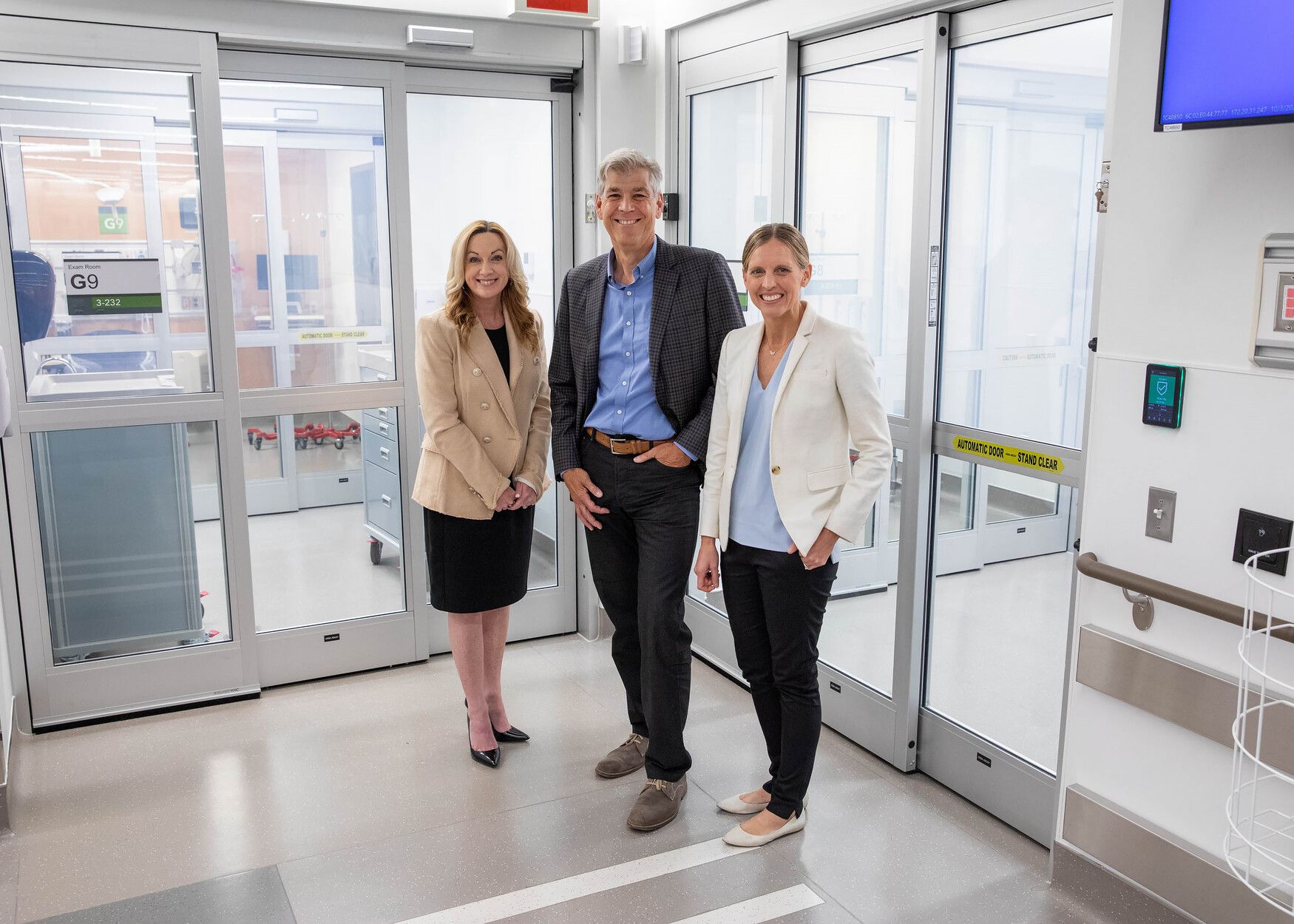Research Report
Dr. Shelley McLeod

Research Report
This has been another successful and productive year for SREMI researchers and scholars, and I am immensely proud to highlight some of our recent accomplishments.
Research Impact
SREMI continues to grow our academic profile at the international, national and provincial level. With 34 peer-reviewed publications in high-impact journals like New England Journal of Medicine, Nature, and Academic Emergency Medicine, SREMI scientists continue to be leaders in producing emergency medicine research of high quality. Many of our faculty were invited speakers and track chairs at the Canadian Association of Emergency Physicians (CAEP) 2023 conference and continue to be vital members of committees, working groups and panels, acknowledging the important contributions we are making towards emergency medicine.
Dr. Catherine Varner, SREMI Deputy Director and clinician scientist, won the Top Pediatric Abstract Award at this year’s CAEP Annual Scientific Meeting for her research study entitled, “Maternal emergency department use before pregnancy and infant emergency department use after birth.” This population-based cohort study of more than two million livebirths found that an ED visit within 90 days before the start of pregnancy was associated with a higher risk of infant ED visits, and potentially offers a useful trigger for health system interventions to decrease acute care utilization for low acuity indications in infancy.
Commissioned by the Society for Academic Emergency Medicine (SAEM), Dr. Bjug Borgundvaag has been leading the GRACE-4 guidelines on alcohol use disorder and cannabis hyperemesis syndrome management in the ED, which will be published later this year. He has also been leading the development of an educational program designed to improve the care of patients with alcohol use disorder by increasing the prescription of anti-craving medications in the ED.
Over the past year, SREMI clinician scientist Dr. Rohit Mohindra continued to build the emergency medicine research program at North York General Hospital, successfully leading and participating in multiple on-going projects. One new initiative started by Dr. Mohindra is EM Cases Journal Club, a monthly blog where he and I critically appraise current research articles in an approachable way so physicians can stay updated on the latest research, evidence-based practices, and advancements in emergency medicine.
Dr. Jacques Lee, our SREMI Research Chair in Geriatric Emergency Medicine, continues to enrol patients in his social isolation and loneliness trial, an initiative to determine whether virtual video check-ins are equally or potentially more effective than telephone calls to help combat social isolation and loneliness in older people. Dr. Lee also graduated his first geriatric emergency medicine research fellow, Dr. Judah Goldstein and oversaw the successful defense of his Masters student, Sara Corvinelli.
Earlier this year I completed the provincial evaluation of Ontario’s virtual urgent care pilot program, which helped inform provincial policy decisions on how to structure virtual care services across the province.
At the joint request of the Ontario Ministry of Health, Ontario Hospital Association, Ontario Medical Association and Ontario Emergency Services Advisory Committee, we are about to launch the third iteration of the Predictors of Workload in the Emergency Room (POWER) study. Conducted in 21 Ontario hospitals between 2003 and 2006, the first two iterations of the POWER study amassed data on nearly 30,000 separate ED patient encounters over 1359 shifts, and examined the workload faced by nearly 400 different emergency physicians in both academic health science centers and community hospitals. Data derived from the POWER study were subsequently used as the basis of a formula used to determine physician hours of coverage for the ED Alternate Funding Arrangement workload model used in Ontario and other provinces. The results from POWER III will be used to predict future ED staffing needs and determine appropriate levels of funding for EDs with very different case mixes.



External Research Funding
Dr. Keerat Grewal received a grant from the Canadian Institutes of Health Research, Canada's federal funding agency for health research, to explore current pathways to cancer care for patients diagnosed with cancer in the ED and examine facilitators and barriers to optimal cancer care for these patients. Dr. Grewal hopes to use the results of this study to lay the foundation towards standardizing referral pathways to specialized cancer care from the ED.
Building on her exceptional research program in early pregnancy, Dr. Varner received an innovation fund grant to evaluate a new program called Virtual Wraparound Care, which supports patients as they experience symptoms of pregnancy loss. The evaluation will seek patient and provider input to create more supportive and more informed care of Canadian’s experiencing early pregnancy complications and loss.
Dr. Mohindra received a grant from the CAEP Emergency Medicine Advancement Fund to explore what medical issues bring refugees to the ED and understand the patient perspective and lived experience of their encounters with our acute care system. Dr. Mohindra found there is a high mental health burden in the refugee population seeking emergency care and access to primary care is a significant barrier for refugee patients. These results will inform patient education programs and future initiatives designed to improve access to healthcare for refugee patients in our communities.
I would like to thank our Director, Dr. Bjug Borgundvaag for his continued leadership, SREMI faculty and staff for their hard work and unwavering commitment to our shared goals, and our generous benefactors, whose support is the ultimate driving force behind all our achievements. Cheers to a year of triumphs, growth, and the limitless potential that lies ahead. I am truly honored to work with and learn from such an exceptional group of individuals.
Respectfully submitted,
Shelley McLeod, PhD, MSc, MSc, BSc (hons)
Research Director, SREMI
